Miffy was created, written and drawn by Dutch artist and writer Dick Bruna
I drew his portrait and interviewed him in 2005.
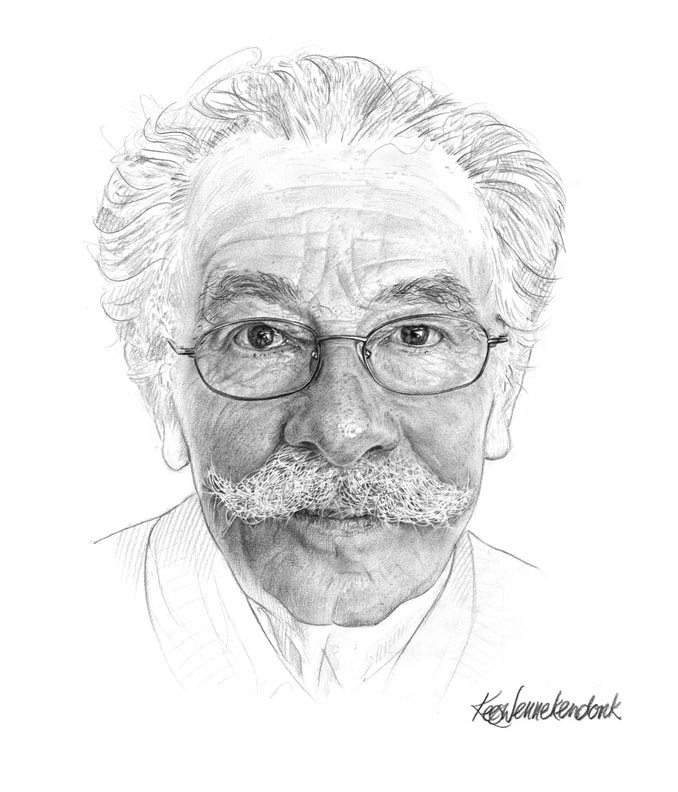
Kees Wennekendonk, pencil, 2005
Dick passed away in february 2017
. He was a great friend and teacher to me.
You can see his original portrait in my exhibition in the Central Museum Utrecht, Holland. 130 cm x 150 cm. Opposite the Miffy Museum! Until 28th of may 2017.
You can buy a wonderfull reproduction of this drawing in every size you wish, by sending me a email .
Check the Centraal Museum.
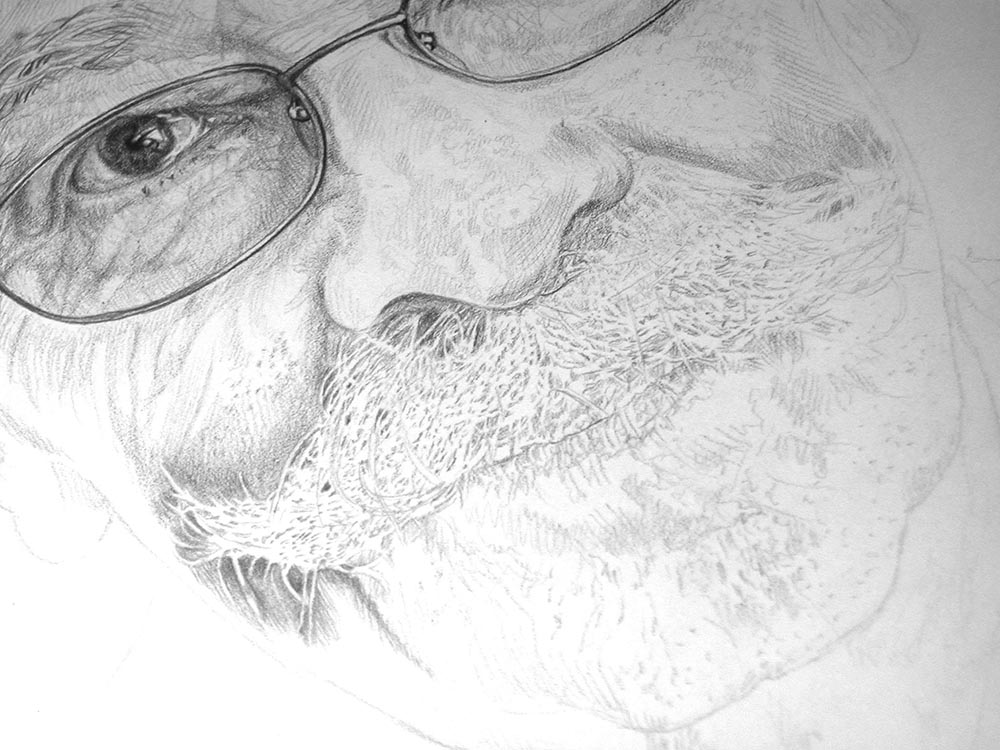
Drawing the master
Interview with Dick Bruna 2005.
We sit in his studio to Jerusalem in Utrecht. I often stopped by, but now I'm going to interview him. As always, I brought a fruit tart, and Dick made us coffee. The sun shines through the window.
Dick, if you were some pastry, what would you be for pastry?
I do not know if 'Bram' you say something, but it's a kind of cake-pastry with a little note of it. Such a small, dry cake. I like that. But with a little soft inside.
If you were a movie star, movie star what would you be?
What I always found myself splendid Chaplin.
Which part of Chaplin associate yourself?
Those stories such as 'Modern Times'. What he really that all those modern time along with the screws. I do remember that he is in a factory over some rad and all will join all those people who are engaged in assembly line work. I think that's done so incredibly nice to him. And he had other things at some point you see him in a cottage on the side of a mountain. Then he walks in one direction and then you see that house so step aside. And that's so damn exciting. I think that's, to me, the search for simplicity, with very few resources, thus you get such a huge stress. There is a film about one of my books. I found one of the best things to run a small man with a rope. And then at some point, if he is in the center, lets you shoot him briefly next. Your heart is cardiac arrest at the time. That kind of small things attracts me very much.
If you were a writer, a writer which you identify which writer would you be?
Yes, I find difficult, I have a lot of writers known by all the folders that I have made, but if I have to choose so, it would be Simenon. If you had read two pages in Simenon, you all sat in that atmosphere, not only in Paris but also from many other ..., you were in the rain or you sat on the snow or something, you had to pack it all, on the second page. And I was always incredibly handsome. But again the simplicity hurry.
(The phone rings: Dick or will give permission to a bear that he has signed to stabbing specially for Christmas in a different guise.)
.... this was for a special purpose, for pigs in need, or something. I've stuck with pleasure to work and then asked if briefly soon or they may change in some way in a pig suitable for Christmas. And stuff I do not. I like to do things for charity. But they should not sit down to play around, I do not want.
Simenon we had the writers, because you immediately into the story.
Yeah, because you immediately as is, because he is actually in a very well already, so I always come back to that simplicity, in a very simple manner in one or two pages you put down, you're suddenly in the rain in Paris or on the coast or I do not know anything.
With little tricks ..
And that's what I've always tried, and certainly for his covers at that time, in order to give that really like that only, not a protagonist on it, because they see you and I differ. Simenon always responded to those folders, always. I was always told what he thought, sometimes when he did not feel well. Then I made the most of. I remember the last letter I received from him when he was old because he was the age of my father about after I had sent him my folder: The folder you created for my latest book is even simpler than what you made for the previous, trying to draw achieve the same if I writing?. Well, see if you hear something from someone I looked reluctant, and still, there you are happy with, then you walk around with your head in the clouds. If you were a road, which road would you be?
There are those signs of two crossing, in such a triangle with a boy and a girl inside.
Hand in hand.
I remember I used to think of: gee, I wish I could do that, I would make it better than it is now.
If you were a bird, what would you be for bird?
I think a homebody.
A homebody. Since I will not go on asking questions.
Well I know there is furthermore little trick of a homebody. There are not many more, but they are more cherished again. I once signed a homebody, so on the edge of a table, I found a pretty good full round birdie.
If you were a predator?
A real predator (long pause). The difficult is it that you think of things you have drawn. Maybe a fox. That's a predator huh?
Yes, but why a fox?
I think that it is not so great, and I always very ..., it is a common thing, but I think it does have something elegant and beautiful.
If you were a musical instrument?
A wooden flute. So say a recorder or so, there you will then rush down to. There is also a tone at once, a natural sound. Yes.
If you were a material?
Wood, absolutely.
You got a special preference?
I just think, pine. Because I know it always comes back to me, are a result of the book is made a lot of toys. I'm always fighting with that toy factories: boys do not just things of plastic, you try to make wood, we hold fundamentally do more, a lot more than all those plastic junk. I notice it even if there are kids in the studio, the first thing they grab is the building blocks standing there. That's plain wood. Whitewood and I like.
If you were a light source?
The sun.
If you were a road?
What I love are the paths that ordinary rather narrow paths along the rivers, along the water.
Chase Trails?
Yes that a towpath, which I like. Such kind of path just where I could ride along.
If you were a composer?
I have always been very fond of earlier French chanson, which I always found very beautiful. And the melodies they made it. Charles Trenet often did himself, which I found very nice. What makes Aznavour I find beautiful. But Charles Trenet's really been an example for me.
Do you have a song that you say this in particular?
Well of course there are his songs, La Mer for example. That song you sing like when you walk along the sea.
If you were a law of nature?
I always find it a great pity that everything is so terribly crammed with all things that are so ugly. Then after the war that houses had to be built, which is logical, but then the same row houses were put everywhere just that I hated. And I still feel that what we are doing, it is getting fuller. You have lost the people that I understand all that, but that is still not done enough to save the green and nature, because without it you nowhere. I'm sorry for the cleaning of things. I know once we lived on the canal, on the other side of Utrecht. At that time we went there to swim and that gives you well not in your head. And I really feel very sorry that it has become so.
Are you someone who has struggled with chaos?
Yes. I know I am constantly cleaning. That is something I, and perhaps also by the time I grew up, when we were very busy putting everything right. One of my best friends has been Pieter Brattinga, who now no longer alive, but he was always busy square and always had to explain the things right. And I have very strong. Even when I get home and there was someone to clean things up, and all frames are crooked, all books are crooked, then I'm really trying to put things neatly. I also have it here I can make awful mess when I'm working. And then at some point it goes over my head and then I want to organize it immediately, that the weather is clean and things back is straight. You will always see me as a pile of books than I'm always trying it briefly this: to lay wham, wham right.
And is that something you think a generation or is it something personal?
I think it's something the generation, because yes god people like Rietvelt which have also had, put that right. And also all kinds of designers from that time like Sandberg and Mondrian course, that whole style time. I can when I sit at your table and I see a lopsided, that irritates me terribly and I think I get up and briefly hang things right.
This straightening habit, where it comes from?
I think it is in me. I see it in the work, whatever I do, whether I make a folder, or a poster or a Christmas card, or that I'm working on a children's book: I always organize. I find myself also no illustrator, I could make a portrait of you, so I am not a draftsman. I do it sometimes with Peter Vos talked about, which I'm very good friends with, if we are so very different. For it is with me as I should draw you, then it would be a form. I'd try terribly to leave plenty of room around it for your own imagination. I feel a lot more a graphic designer or graphic artist than a painter or an artist or an illustrator. That sort has always been in me. With those folders too, I saw folders of people from abroad and then I thought to myself, what a pity that they have not taken into rekeing that there is also a text must, for example, because the text that has the same .., it must be a balance. Then make it much simpler, but keep space for the text.
I used it once in a while, at the very beginning, something illustrated, but then it's always been just print making.
How is it that extra attention in Asian countries for work?
I've been a few times in Japan and there I also noticed the simplicity. As a house is equipped with a pair of cross pieces of paper sometimes, they can move and where they sleep. For example, a garden, how to make a garden. They are sometimes very small gardens as it is all too expensive. They have for example a piece of gravel, where they pick up a rake through and then they feel that there is a stream running through their garden, you understand that kind of fantasy. And then they are also there, on the side and they are located so to say: such a stream that goes through it. And I have also seen a park in Tokyo, which is laid so that wherever you are you will always get a sort of dreamy idea, almost everywhere there is a story.
So your job too: not cold, even though it's simple?
No, I hope not no. You also have the graphical things that really only stay very cool, but I do not think it does to me. I have always felt what comes from here, whether it is a folder or whatever, it must be 100% of what you can at the time. The strange thing is that although my work has become increasingly easier, I still find it just as hard as when I first engaged was.En now, if I have to make a book about Miffy, I make the first drawings and then I think to myself, it looks like I've never signed. That's really true. They say: it should not be so difficult for you, but I'm finding it harder rather than less difficult. You want to always do better. You want to do better today than yesterday, which is in it, I've always had, I've always had this may still .. I'm still trying different. And of course the stories and drawings, either. I've always found exciting making those books that you do everything. You try to think of the story you can really show in 12 drawings.
November 14th 2005, Utrecht, The Netherlands
Kees Wennekendonk
In het Nederlands:
Op NPORadio1 mocht ik na zijn overlijden in het programma Nieuws & Co wat over hem vertellen. We staan in zijn atelier in het Centraal Museum Utrecht.
Interviewer is Mark
Robin Visser.
U kunt dat hier terugluisteren.
Interview met Dick Bruna 2005.
We zitten op zijn atelier aan de Jeruzalemstraat in Utrecht. Ik ben vaker langsgeweest, maar nu ga ik hem interviewen. Zoals altijd heb ik een vruchtentaartje meegenomen, en zet Dick koffie. De zon schijnt door het raam.
Dick, als jij zo'n gebakje zou zijn, wat voor gebakje zou je dan zijn?
Ik weet niet of een 'brammetje' je iets zegt, maar dat is 'n soort van cake-gebakje met iets van noot erin. Zo'n klein, droog gebakje. Dat vind ik lekker. Maar wel met een beetje zacht van binnen.
Als jij een filmster was, welke filmster zou je zijn?
Wat ik altijd zelf prachtig gevonden heb: Chaplin.
Met welk gedeelte van Chaplin associeer je jezelf?
Die verhalen zoals bijvoorbeeld 'Modern Times'. Waar hij echt zo helemaal met die modern time mee gaat, met dat schroeven. Ik weet nog wel dat hij in een fabriek over een of ander rad heen ligt en helemaal mee gaat doen met al die mensen die met het lopende band werk bezig zijn. Dat vind ik zo ongelooflijk mooi gedaan bij hem. En zo had hij ook andere dingen: op een gegeven moment zie je hem in een huisje, op de kant van een berg staan. Dan loopt hij een kant op en dan zie je dat huisje zo opzij gaan. En dat is zo donders spannend. Ik denk dat dat komt, bij mij, door het zoeken naar eenvoud, met heel weinig middelen, daardoor krijg je zo'n enorme spanning. Er is een film gemaakt over een van mijn boekjes. Ik vond een van de leukste dingen om een klein mannetje over een touw te laten lopen. En dan op een gegeven moment, als hij middenin is, laat je hem eventjes ernaast schieten. Je hart staat hart stil op dat moment. Dat soort van hele kleine dingen trekt mij zeer.
Als jij een schrijver zou zijn, een schrijver waarmee jij je identificeert, welke schrijver zou je zijn?
Ja, dat vindt ik moeilijk, ik heb erg veel schrijvers gekend door al die omslagen die ik gemaakt hebt, maar als ik zo moeten kiezen, dan zou het Simenon zijn. Als je bij Simenon twee pagina's gelezen had, zat je helemaal in die sfeer, niet alleen van Parijs maar ook van allerlei andere ..., je zat in de regen of je zat op de sneeuw of zoiets, je had het helemaal te pakken, bij de tweede pagina al. En dat vond ik altijd ongelooflijk knap. Maar ook weer die simpelheid haast.
(De telefoon gaat: of Dick toestemming wil geven om een beer die hij heeft getekend speciaal voor de kerst in een ander jasje te laten steken.)

....dit was voor een speciaal doel, voor varkens in nood, of zoiets. Daar heb ik indertijd met plezier voor gewerkt en dan wordt zo eventjes gauw gevraagd of ze dat op de een of andere manier mogen wijzigen in een varkentje dat geschikt is voor de kerstmis. En dat soort dingen doe ik niet. Ik vind het fijn om dingen voor goede doelen te doen. Maar dan moeten ze er niet aan gaan zitten rotzooien, dat wil ik niet.
Simenon hadden we gehad bij de schrijvers, vanwege dat je meteen in het verhaal zit.
Ja, omdat je er meteen zo in zit, omdat hij eigenlijk op een hele ook al weer, ja ik kom altijd weer terug op die eenvoud, op een hele eenvoudige manier in een of twee pagina's je neer zet, je staat ineens in de regen in Parijs of aan de kust of weet ik veel wat dan ook.
Met weinig streken..
En dat is ook wat ik altijd geprobeerd heb, en zeker voor zijn omslagen in die tijd, om dat echt alleen zo aan te geven, dus niet een hoofdpersoon erop, want die zien jij en ik verschillend. Simenon reageerde altijd op die omslagen, altijd. Ik kreeg altijd te horen wat hij ervan vond, ook wel eens als hij het niet goed vond. Dan maakte ik het meestal over. Ik weet nog de allerlaatste brief die ik van hem gekregen heb, toen hij al oud was want hij had de leeftijd van mijn vader ongeveer, nadat ik hem mijn omslag had opgestuurd: De omslag die je voor mijn laatste boek gemaakt hebt is nog eenvoudiger dan wat je voor het vorige gemaakt hebt, je probeert met tekenen hetzelfde te bereiken als ik met schrijven ?. Nou kijk als je zoiets van iemand hoort waar ik tegenop keek, en nog wel, daar ben je blij mee, dan loop je een beetje met je hoofd in de wolken.
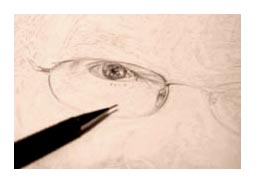 Als je een verkeersbord was, welk verkeersbord zou je dan zijn?
Als je een verkeersbord was, welk verkeersbord zou je dan zijn?
Je hebt van die borden van twee kinderen die oversteken, in zo'n driehoek met een jongetje en een meisje erin.
Hand in hand.
Ik weet nog dat ik vroeger dacht van: goh ik wou dat ik dat mocht maken, ik zou dat leuker maken dan het nu is.
Als je een vogel was, wat voor vogel zou je zijn?
Ik denk een huismus.
Een huismus. Daar ga ik verder niet over doorvragen.
Nou weet ik er verder ook weinig van hoor,van een huismus.
Er zijn er niet veel meer van, maar ze worden weer meer gekoesterd.
Ik heb wel eens een huismus getekend, zo op de rand van een tafel, dat vond ik een mooi lekker vol rond vogeltje.
Als je een roofdier zou zijn daarintegen?
Een roofdier echt (lange stilte). Het moeilijke is dan toch dat je denkt aan dingen die je getekend hebt. Misschien een vos. Dat is een roofdier he?
Jazeker, maar waarom een vos?
Ik denk doordat het niet zo groot is, en ik het altijd heel ..., het is wel een gemeen ding, maar ik vind het wel iets elegants en moois hebben.
Als je een muziekinstrument zou zijn?
Een houten fluit. Dus zeg maar een blokfluit of zo, daar kom je dan haast op neer.
Daar ook een toon tegelijk, een natuurlijke klank.
Ja.
Als je een materiaal zou zijn?
Hout, absoluut.
Heb je daar nog een speciale voorkeur in?
Ik denk gewoon, vurenhout. Want ik weet dat dat ook altijd terugkomt bij mij, er zijn naar aanleiding van de boeken is er nogal wat speelgoed gemaakt.
Ik ben ook altijd aan het vechten geweest met die speelgoedfabrieken: jongens maak niet alleen maar dingen van plastic, probeert u ook van hout te maken,
daar houden we au fond toch meer van, heel wat meer van dan van al die plastic troep. Ik merk het nu nog, als hier kinderen komen, in het atelier, het eerste
wat ze pakken is die blokkendoos die daar staat. Dat is doodgewoon hout. En vurenhout vind ik mooi.

Als je een lichtbron zou zijn?
De zon.
Als je een weg zou zijn?
Waar ik van hou zijn die wegen, die gewone vrij smalle wegen langs de rivieren, langs het water.
Jaagpaden?
Ja dat, een jaagpad, dat vind ik mooi. Zo'n soort pad gewoon waar ik langs zou kunnen fietsen.
Als je een componist zou zijn?
Ik ben altijd erg dol geweest vroeger op het Franse chanson, dat heb ik altijd ontzettend mooi gevonden. En ook de melodie?n die ze erbij maakten. Charles Trenet deed het vaak zelf, dat vond ik erg mooi. Wat Aznavour maakt vind ik ook mooi. Maar Charles Trenet is voor mij echt wel een voorbeeld geweest.
Ken je nog een lied waarvan je zegt: dit met name?
Nou er zijn natuurlijk liederen van hem, La Mer bijvoorbeeld. Dat lied dat zing je graag als je langs zee loopt.
Als jij een natuurwet was?
Ik vind het altijd ontzettend jammer dat alles zo ontzettend volgebouwd wordt met allemaal dingen die zo lelijk zijn. Toen er na de oorlog dat er huizen gebouwd moesten worden, dat is een logische zaak, maar dat er dan overal precies dezelfde rijtjeshuizen neergezet werden, dat vond ik vreselijk. En ik heb nu nog het gevoel dat wat wij aan het doen zijn, dat het steeds voller wordt. Je moet de mensen kwijt, dat begrijp ik ook allemaal wel, maar dat er toch te weinig aan gedaan wordt om het groen en de natuur te sparen, want zonder dat ben je nergens. Ik ben erg voor het schoonhouden van dingen. Ik weet wel vroeger woonden we aan het kanaal, aan de ander kant van Utrecht. In die tijd gingen we daar zwemmen en dat haal je nou niet meer in je hoofd. En dat vind ik echt erg jammer, dat het zo geworden is.
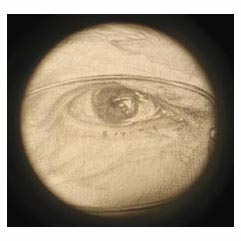 Ben jij iemand die moeite heeft met chaos?
Ben jij iemand die moeite heeft met chaos?Ja. Ik weet dat ik constant aan het opruimen ben. Dat is iets wat ik, en dat is misschien ook wel door de tijd dat ik ben opgegroeid ben, dat we toen erg bezig waren met alles recht te leggen. Een van mijn beste vrienden is Pieter Brattinga geweest, die leeft nu niet meer, maar die was ook altijd in het vierkant bezig en die was ook altijd met de boel recht te leggen. En dat heb ik heel sterk. Ook als ik thuis kom en er is iemand geweest om de boel schoon te maken, en alle beeldjes scheef staan, alle boeken scheef liggen, dan ben ik erg bezig om de boel weer netjes te leggen. Ik heb het hier ook: ik kan ontzettende rotzooi maken als ik bezig ben. En dan op een gegeven moment loopt dat over mijn hoofd en dan wil ik dat onmiddellijk weer ordenen, dat het weer schoon is en dat de boel weer recht ligt. Je zal me ook altijd zien dat als er een stapeltje boeken ligt dan ben ik ook altijd bezig om dat eventjes zo: wham, wham recht te leggen.
En is dat iets van een generatie denk je of is het iets persoonlijks?
Ik denk wel dat het iets van de generatie is, want ja god mensen als Rietvelt hebben dat natuurlijk ook gehad, dat recht leggen. En ook allerlei ontwerpers uit die tijd zoals Sandberg en Mondriaan natuurlijk ook, die hele stijltijd. Ik kan ook als ik bij jouw zit en ik zie een lijst scheef hangen, dat irriteert me vreselijk en dan denk ik dat ik opsta en eventjes de boel recht hang.
Waar komt die rechtleggerij vandaan?
Ik denk dat het in mezelf zit. Ik merk het in het werk ook, wat ik ook doe, of ik nou een omslag, of een affiche, of een kerstkaart maak, of dat ik met een kinderboek bezig ben: ik ben altijd aan het ordenen. Ik vind mezelf ook helemaal geen illustrator, ik zou geen portret van jou kunnen maken, zo'n tekenaar ben ik niet. Ik heb het er wel eens met Peter Vos over gehad, waar ik erg goed bevriend mee ben, zo ontzettend verschillend als we dan zijn. Want het is bij mij als ik jou zou moeten tekenen, dan zou het een vorm worden. Ik zou vreselijk proberen om veel ruimte eromheen te laten voor je eigen fantasie. Ik voel me dan ook veel meer een grafisch vormgever of grafisch ontwerper dan een schilder of een tekenaar of een illustrator. Dat ordenen heeft er bij mij altijd in gezeten. Met die omslagen ook, dan zag ik omslagen van mensen uit het buitenland en dan dacht ik bij mezelf: wat jammer dat ze er geen rekeing mee gehouden hebben dat er ook nog een tekst in moet bijvoorbeeld, want die tekst dat moet dezelfde .., dat moet een balans zijn. Maak het dan wat simpeler, maar houd ruimte voor die tekst.
Ik heb vroeger wel eens een keertje, helemaal aan het begin, iets geillustreerd, maar daarna is het toch altijd gewoon prentenmaken geweest.
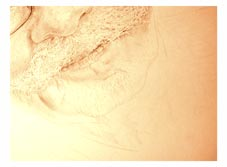 Hoe komt het dat in Aziatische landen extra veel aandacht is voor je werk?
Hoe komt het dat in Aziatische landen extra veel aandacht is voor je werk?Ik ben een paar keer in Japan geweest en daar is mij ook de eenvoud opgevallen. Zoals een huis ingericht wordt, met een paar wandjes van papier soms, die ze verzetten kunnen en waar ze dan slapen. Bijvoorbeeld een tuin, hoe ze een tuintje kunnen maken. Het zijn soms hele kleine tuintjes omdat het allemaal te duur is. Dan hebben ze bijvoorbeeld een stukje grind, daar halen ze een hark doorheen en dan hebben ze het gevoel dat er een stroompje door hun tuintje gaat, begrijp je wel, dat soort van fantasie. En dan gaan ze er ook zitten, aan de kant en dan zitten ze zich dat zo voor stellen: zo'n stroompje wat er doorheen gaat. En ik heb ook wel eens een parkje in Tokio gezien, dat is dan zo aangelegd dat waar je ook gaat staan je altijd een soort van dromerig idee krijgt, haast overal zit een verhaal.
Zo is jouw werk ook: niet koud, ondanks dat het simpel is?
Nee, dat hoop ik niet nee. Je hebt ook van die grafische dingen die echt alleen maar heel koel blijven, maar dat geloof ik niet dat dat bij mij zo is. Ik heb ook altijd het gevoel gehad wat er hier vandaan komt, of het nou een omslag is of wat dan ook, het moet 100% zijn van wat je op dat moment kan. Het gekke is wel, dat ondanks dat mijn werk steeds eenvoudiger is geworden, ik het nog steeds net zo moeilijk vind als toen ik pas bezig was.En nu nog, al moet ik een boekje over Nijntje maken, ik maak de eerste tekeningen en dan denk ik bij mezelf: het ziet eruit alsof ik nog nooit getekend heb. Dat is werkelijk waar. Ze zeggen wel eens: het moet voor jou niet zo moeilijk zijn, maar ik ga het eerder moeilijker vinden dan minder moeilijk. Je wilt het altijd beter doen. Je wilt het vandaag beter doen dan gisteren, dat zit erin, dat heb ik ook altijd gehad, ik heb altijd gehad van dit kan nog .., ik ga het nog anders proberen. En in de verhalen natuurlijk en in de tekeningen, beide. Dat heb ik ook altijd spannend gevonden van die boeken maken, dat je alles doet. Dat je het verhaal probeert te bedenken dat je echt in 12 tekeningen kan weergeven.
Kees Wennekendonk
november 2005
